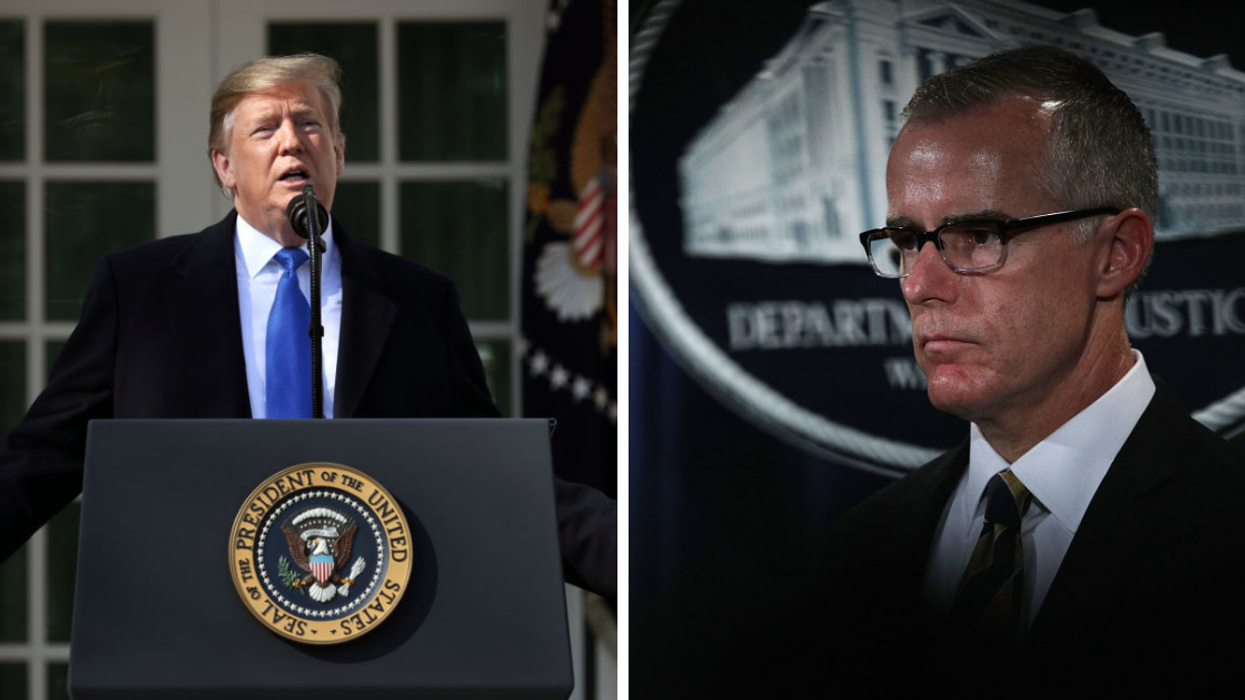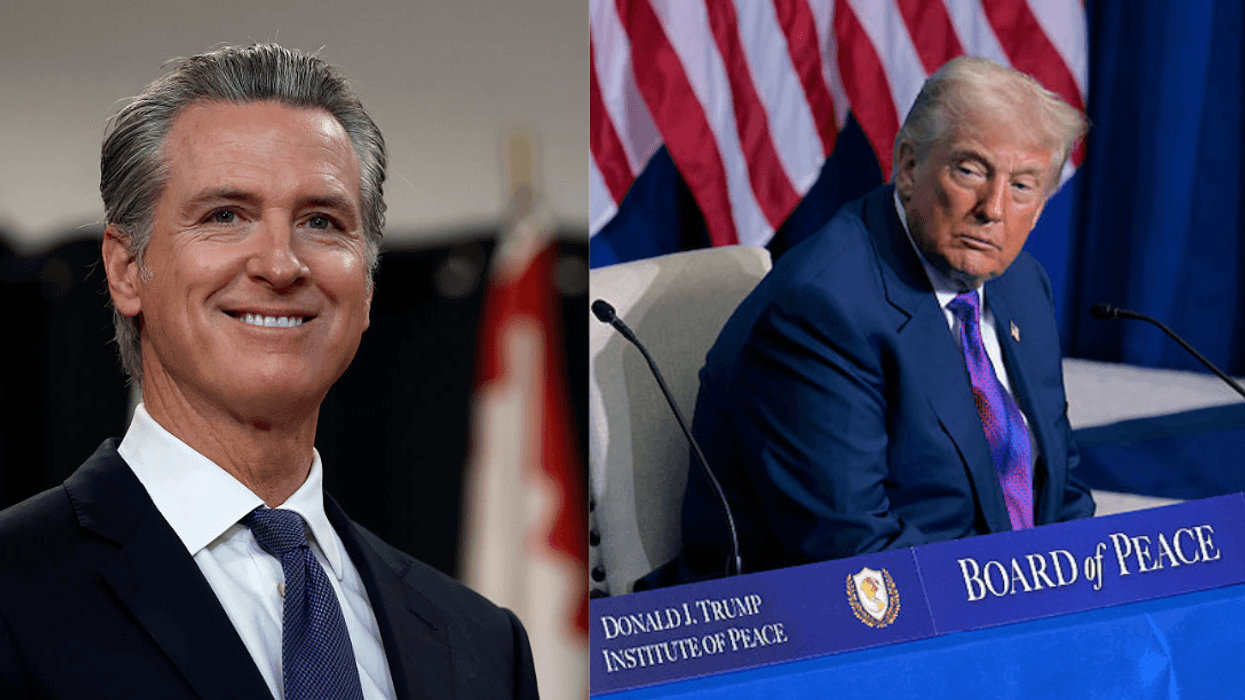The saga between President Donald Trump and former FBI Director Andrew McCabe continues.
During an interview with 60 Minutes, McCabe said what many outside the Trump administration have said since he was ousted: That he was fired for opening two investigations into the president.
"I am being singled out and treated this way because of the role I played, the actions I took and the events I witnessed in the aftermath of the firing of James Comey," McCabe said.
Perhaps the most unnerving reveal: McCabe also confirmed that Deputy Attorney General Rod Rosenstein raised the idea of removing Trump via the 25th Amendment.
For those of you who don't remember, the 25th amendment, which was ratified in the 1960s, provides procedures for replacing the president in the event that he is removed.
This amendment was invoked when Gerald Ford became president at Nixon's resignation.
The president soon fired back at McCabe, accusing the "disgraced" McCabe of spewing "so many lies."
In the world according to Donald Trump, even raising the notion of removing a president via the 25th Amendment is "a very illegal act," and he added that "There is a lot of explaining to do to the millions of people who had just elected a president who they really like."
The president was roundly criticized and many grilled him about his ties to the Russian government.
McCabe's interview revealed more damning information about the president, whom U.S. intelligence agencies have concluded won the 2016 presidential election with the aid of Russian operatives. That notion formed the basis of Special Counsel Robert Mueller's investigation, a probe that has secured more than 30 indictments and guilty pleas from a number of individuals associated with the Trump campaign, including former campaign chair Paul Manafort and longtime political consultant Roger Stone.
McCabe recalled that Trump was displeased when McCabe told him that he supported former FBI Director James Comey, whom Trump fired to keep Comey from investigating former national security adviser Michael Flynn, who later pleaded guilty to lying to the FBI about his contacts with Russian figures.
McCabe explained that he opened investigations into the president because there was probable cause to believe that the president had obstructed justice.
"I was speaking to the man who had just run for the presidency and won the election for the presidency and who might have done so with the aid of the government of Russia, our most formidable adversary on the world stage. And that was something that troubled me greatly," McCabe said, later adding:
I think the next day, I met with the team investigating the Russia cases. And I asked the team to go back and conduct an assessment to determine where are we with these efforts and what steps do we need to take going forward. I was very concerned that I was able to put the Russia case on absolutely solid ground in an indelible fashion that were I removed quickly or reassigned or fired that the case could not be closed or vanish in the night without a trace.
McCabe elaborated on the "incredibly turbulent" time after Comey's firing, saying that Rosenstein raised the possibility of invoking the 25th Amendment:
Discussion of the 25th Amendment was simply, Rod raised the issue and discussed it with me in the context of thinking about how many other cabinet officials might support such an effort. I didn't have much to contribute, to be perfectly honest, in that— conversation. So I listened to what he had to say. But, to be fair, it was an unbelievably stressful time. I can't even describe for you how many things must have been coursing through the deputy attorney general's mind at that point. So it was really something that he kinda threw out in a very frenzied chaotic conversation about where we were and what we needed to do next.
He later added that Rosenstein "was definitely very concerned about the president, about his capacity, and about his intent at that point in time."
McCabe also provided further evidence of Trump's disavowal of U.S. intelligence agencies, as when Trump responded "I believe Putin" when he rejected U.S. intelligence's assessment of North Korean intercontinental ballistic missile capabilities.
It's only Monday.








 The Benny Show
The Benny Show





 @neilforreal/Bluesky
@neilforreal/Bluesky @savannahcat/Bluesky
@savannahcat/Bluesky @qadishtujessica.inanna.app
@qadishtujessica.inanna.app @v-ron/Bluesky
@v-ron/Bluesky @nelnelnellie/Bluesky
@nelnelnellie/Bluesky @beatlenumber9/Bluesky
@beatlenumber9/Bluesky @pinkzombierose/Bluesky
@pinkzombierose/Bluesky
 @theunobsolete/TikTok
@theunobsolete/TikTok @theunobsolete/TikTok
@theunobsolete/TikTok @theunobsolete/TikTok
@theunobsolete/TikTok @theunobsolete/TikTok
@theunobsolete/TikTok @theunobsolete/TikTok
@theunobsolete/TikTok @theunobsolete/TikTok
@theunobsolete/TikTok @theunobsolete/TikTok
@theunobsolete/TikTok @theunobsolete/TikTok
@theunobsolete/TikTok @theunobsolete/TikTok
@theunobsolete/TikTok @theunobsolete/TikTok
@theunobsolete/TikTok @theunobsolete/TikTok
@theunobsolete/TikTok @theunobsolete/TikTok
@theunobsolete/TikTok @theunobsolete/TikTok
@theunobsolete/TikTok @theunobsolete/TikTok
@theunobsolete/TikTok @theunobsolete/TikTok
@theunobsolete/TikTok @theunobsolete/TikTok
@theunobsolete/TikTok @theunobsolete/TikTok
@theunobsolete/TikTok
 @laysuperstar/TikTok
@laysuperstar/TikTok @laysuperstar/TikTok
@laysuperstar/TikTok @laysuperstar/TikTok
@laysuperstar/TikTok @laysuperstar/TikTok
@laysuperstar/TikTok @laysuperstar/TikTok
@laysuperstar/TikTok @laysuperstar/TikTok
@laysuperstar/TikTok @laysuperstar/TikTok
@laysuperstar/TikTok @laysuperstar/TikTok
@laysuperstar/TikTok @laysuperstar/TikTok
@laysuperstar/TikTok @laysuperstar/TikTok
@laysuperstar/TikTok @laysuperstar/TikTok
@laysuperstar/TikTok @laysuperstar/TikTok
@laysuperstar/TikTok @laysuperstar/TikTok
@laysuperstar/TikTok @laysuperstar/TikTok
@laysuperstar/TikTok @laysuperstar/TikTok
@laysuperstar/TikTok